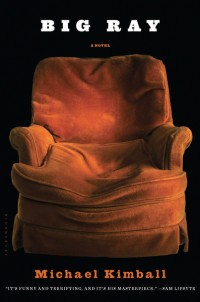25 Points: Big Ray
 Big Ray
Big Ray
by Michael Kimball
Bloomsbury USA, 2012
192 pages / $23.00 buy from Amazon
1. Big Ray blends genre between flash fiction and novel.
2. Each chapter within the work is told in first person confessional episodic moments, which read as a short flash fiction piece which could be read on its own as a complete story.
3. Each of the flash sections rarely surpass 200 words, though the sizes ebb and flow throughout.
4. Kimball heightens intensity by elongating the more anxiety-ridden sections of the book and in parallel compresses the sections which give appropriate if not beautifully told anecdotal backstory. In doing so, Kimball is showing his expertise as the mark of his incredible ability to craft story.
5. Michael Kimball is one of the nicest guys as a person in “the business.” Also, he can write. Dude can write.
6. Kimball is opening the reader to a complicated familial past quickly.
7. We are witness to Big Ray’s past and the way in which his ether has an everlasting effect on our narrator. As our narrator walks between Big Ray’s passing and their intertwined past as father and son Kimball provides us with generously rendered unfolding history, and in doing so, illuminates a thick, vastly layered novel which reads painfully, slowly, like ice melting in the most profound way possible.
8. “It makes him look as if he’s about to do some damage.”
9. Heartbreakingly, there is a kindness at work, a tongue in cheek commentary about the ways in which people, motivated by their own intentions, are terrible to one another, observe:
“Here’s what happened: After high school, my father went into the Marines and my mother went to college. My father lived in the barracks with dozens of other men and my mother moved into an apartment with a roommate who she didn’t know particularly well. To fill in the space between them, my mother and my father wrote letters to each other for months.
Then, without any explanation, my mother stopped receiving my father’s letters. Not long after that, my mother stopped writing letters to my father. Neither one of them knew what had happened. They both waited for months, thinking the other one had stopped writing.
What my mother didn’t know was that my father was still writing her letters. What my father didn’t know was that my mother wasn’t receiving the letters. This was because my mother’s roommate would come home to the apartment at lunch and steal my father’s letters.”
10. A part of the pain our narrator endures is a sense of trying to explain this narrative to himself. Which, is brilliant in that Kimball writes a guy who walks the line between reliable narrator and human being. He wants love, attention, appreciation, but imposed a sense of failure on himself, which leads to resentment and anguish again. What Kimball can do is paint, for any person, the pain felt in never really connecting with a parent, yet simultaneously connecting with a parent by default.
“My father’s life was an ordinary one in so many ways. I wonder if I am making him into something more than he was because he was my father.” READ MORE >
January 10th, 2013 / 12:04 pm
Big Ray by Michael Kimball
Congratulations to Michael Kimball, author of Us, Dear Everybody and The Way The Family Got Away, because this: “I’m having a pretty great year so far and I feel really grateful for it. I don’t even know how to explain how grateful I feel. I’m so happy to announce that I just sold the world rights to a new novel, BIG RAY. It’s the story of a son coming to terms with the sudden death of his obese father. It’s told through 500 brief entries, moving back and forth between past and present, the father’s death and his life, between an abusive childhood and adult understanding. BIG RAY went to Kathy Belden at Bloomsbury USA, which will publish in Fall 2012, and Michael Fishwick at Bloomsbury UK, which will publish in Winter 2013.”
Webaround
 Dennis Cooper’s blog today: “Four Books I’ve Loved Recently: The Ask by Sam Lipsyte, Marsupial by Derek White, A Common Pornography by Kevin Sampsell, and Stories II by Scott McClanahan.” Also, don’t miss yesterday’s “17 examples of how musicians conflate the terms ‘mawkish’ and ‘arch’ with varying degrees of success.”
Dennis Cooper’s blog today: “Four Books I’ve Loved Recently: The Ask by Sam Lipsyte, Marsupial by Derek White, A Common Pornography by Kevin Sampsell, and Stories II by Scott McClanahan.” Also, don’t miss yesterday’s “17 examples of how musicians conflate the terms ‘mawkish’ and ‘arch’ with varying degrees of success.”
From Salon, an article on Bloomsbury’s newest case of the white-outs. “Publishers whitens another heroine of color.” (You might remember that we bugged out about this the last time it happened too.)
Here’s an introduction to “The Secret History of Typography in the Oxford English Dictionary.”
From Jeremy Schmall- Rick Steves on Haiti.
Check out this rad new feature/series at Portland-based Wieden+Kennedy called Story Time, which produces “recorded readings of short stories by published young authors set to soundscapes.” Trinie Dalton is episode #1, Kevin Sampsell’s #2, and that’s all that there is so far, but we’ll be (duh) keeping an eye on these guys, and one hardly doubts that there’s more great stuff ahead. And what is Wieden+Kennedy exactly? They say: “We are an arts and culture digital content delivery platform, a subsidiary of advertising agency Wieden+Kennedy. Our goal is to renegotiate the relationship between art, media, advertising and the consumer.” Ahh, okay then. To help further advance negotiations, you might also check out their other series, Don’t Move Here: Inside Portland’s Music Scene.
